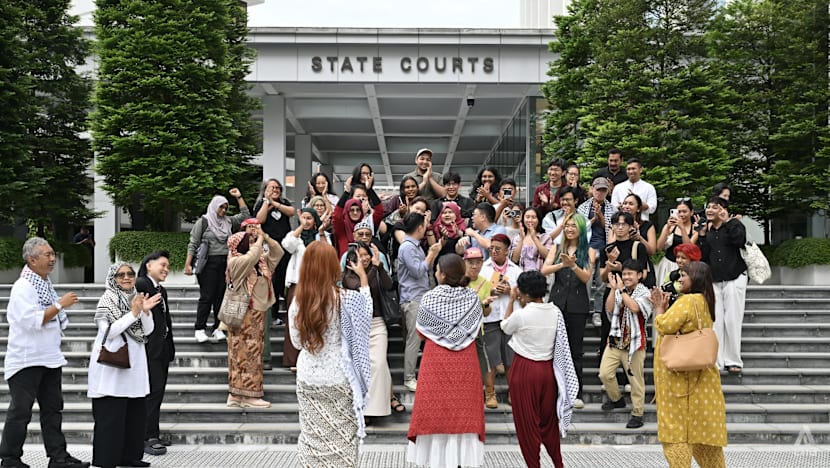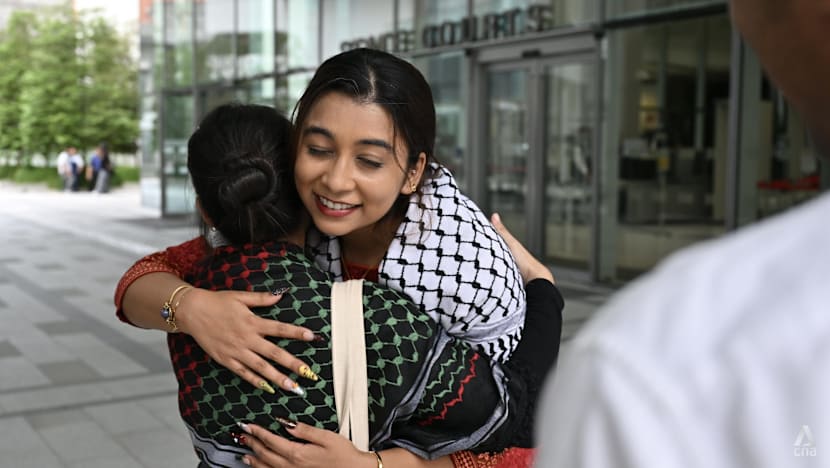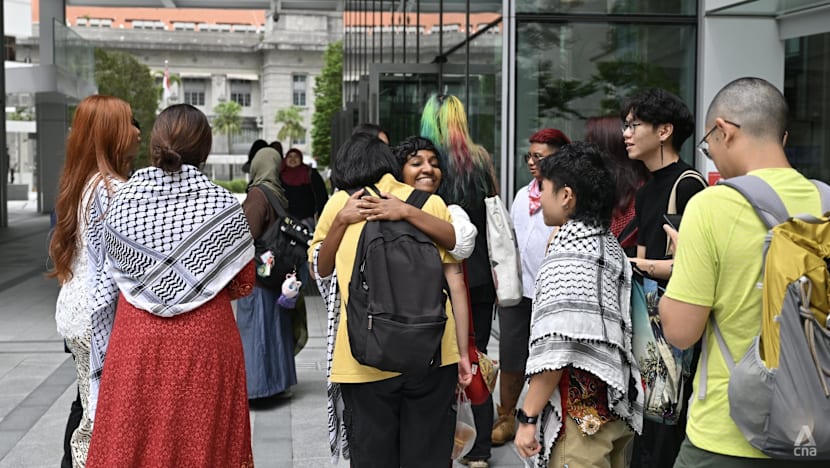Trio acquitted of organising pro-Palestinian procession to Istana
The Attorney-General's Chambers said the prosecution will be appealing the verdict.

From left: Ms Siti Amirah Mohamed Asrori, Ms Annamalai Kokila Parvathi and Ms Mossammad Sobikun Nahar arriving at the State Courts on Oct 21, 2025. (Photo: CNA/Jeremy Long)

This audio is generated by an AI tool.
SINGAPORE: A district court on Tuesday (Oct 21) acquitted three women accused of organising a procession to publicise a cause of solidarity with the Palestinian people, after finding that they did not know that the route they took was prohibited under the Public Order Act.
The acquittal of the three Singaporean women, Ms Mossammad Sobikun Nahar, 26, Ms Siti Amirah Mohamed Asrori, 30, and Ms Annamalai Kokila Parvathi, 37, was met with jubilant reactions from the public gallery.
The courtroom was packed with supporters, who whooped and cheered as they left the room, then regrouped on the steps outside the State Courts.
In response to queries from CNA, the Attorney-General's Chambers said the prosecution will be appealing the verdict.
The three women had each contested one charge under the Public Order Act of organising a procession publicising the cause of solidarity with the Palestinian people between 2pm and 3pm on Feb 2, 2024, along the perimeter of the Istana.
The women were part of a group of about 70 people who walked from Plaza Singapura mall to the Istana's rear gate to hand deliver letters on the Palestinian cause to the Prime Minister's Office, which is located in the Istana and had a mail drop-off point there.
The prosecution, led by Deputy Public Prosecutor Hay Hung Chun, had stressed during the trial that the women were not charged with supporting the cause, or for writing or delivering letters in support of the cause.
District Judge John Ng said that in this case, the prosecution bore the burden of proving the two basic elements of the case - the "actus reas" or guilty act and the "mens rea", meaning a guilty state of mind.
Judge Ng found that the prosecution had proved the first element of the charges - that Ms Sobikun and Ms Amirah had organised the procession, with Ms Annamalai assisting on the day itself.
However, he agreed with the defence lawyers, Mr Derek Wong and Mr Uthayasurian Sidambaram from Phoenix Law, that the prosecution did not prove the second element - that the women ought reasonably to have known that the procession took place in a prohibited area.
This was because the area outside the Istana was a public area with no signs to indicate that the public path was a prohibited area.
Judge Ng said there had been several similar walks to deliver letters to the rear gate of the Istana, where the mailroom was located.
He said it was clear from the evidence that the three women "were trying their level best not to run afoul of the law" in delivering the letters, even though, contrary to their best efforts and thinking, the walk amounted to a procession.
Judge Ng said it was undisputed that Ms Sobikun and Ms Amirah had organised the event to publicise the cause of solidarity with the Palestinians, as evident from the use of umbrellas with watermelon designs.
He said it was disingenuous for the trio to suggest that they were only helping to deliver letters and deny that they were publicising the cause of solidarity with the Palestinians.
While it was true that the participants had gathered to deliver letters, Judge Ng said it was not their only intention.
This was only a part of the larger purpose, which was to express solidarity with the Palestinians, he said, calling the humanitarian situation in the Palestinian territories "the sad backdrop to this case".
He said Ms Sobikun had admitted to having a discussion with Ms Amirah and deciding that the activity could be a good way to "get a response" from the prime minister.
The defence tried to downplay this admission by saying it was a "plain exercise in delivery" and attempted to dissociate the women's actions from the cause and to water them down, said Judge Ng.
The attempts were "both disingenuous and disappointing", said the judge.
He said the trio would be "trying to pull wool over everyone's eyes" if they denied having the intention to publicise the cause.
"Persons with true, honest convictions should not resort to a play on words to escape liability," he said, to audible gasps from the packed public gallery.
"Was the use of umbrellas because they looked cute and attractive and because they could be used in case of rain?" asked Judge Ng.
He said it was true the umbrellas could be used for this purpose, but they were also undeniably identified with the Palestinian cause.
However, he found that the prosecution had failed to prove that the women ought reasonably to have known that the route they took was in a prohibited area.
The pavement was regularly used by the public and there were no signs to inform those in the area that the public path was part of a prohibited area, said the judge.
The previous similar walks delivering letters to the Istana's rear gate did not give the women any basis to "displace the reasonable notion" that the route was anything other than public access to the Istana gate where the mailroom was located.
"They would not have any inkling that using that route would be illegal or prohibited," said Judge Ng, finding that the women had "an honest and reasonable belief" that they were not in breach of the law.




Speaking to CNA after the acquittal, Ms Amirah said she was "grateful" for the "unexpected" outcome.
Ms Sobikun said they were "really thankful for the community that has stood behind us all along", while Ms Annamalai said this "is an incomplete victory" and that there is "a long road ahead to win our civil liberties as well as Palestine's freedom".
Had the women been convicted of organising a procession in a prohibited place under the Public Order Act, they could have been jailed for up to six months, fined up to S$10,000, or both.















